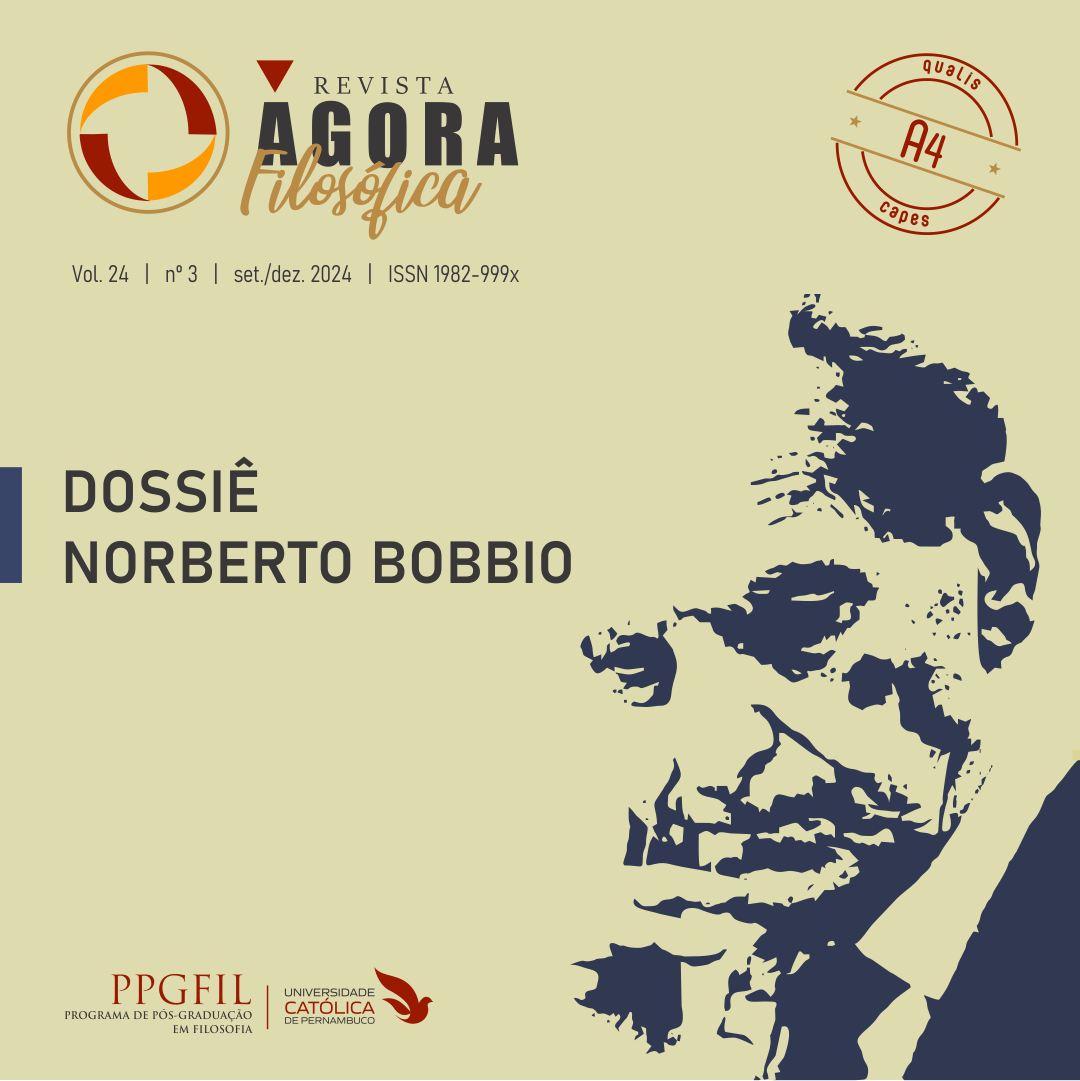The question of citizenship: revisiting Bobbio
DOI:
https://doi.org/10.25247/P1982-999X.2024.v24n3.p53-70Keywords:
politics, democratic regime, crisis, social expectations, citizenshipAbstract
20 years after Norberto Bobbio's death, the article discusses the relevance of his political thought. Initially, a series of limitations to democracy are presented, either due to the actions of charismatic leaders or the restrictions imposed by the market. Taking the loss of the substance of citizenship as the end point of these processes, we revisit some passages from The Future of Democracy, the first edition of which is 40 years old. Our hypothesis is that this revisit can both constitute a seismograph of the social frustrations that run through the malaise of democracy and broaden the repertoire of initiatives committed to its defense.
Downloads
References
ADORNO, T. W. Aspekte des neuen Rechtsradikalismus. Frankfurt am Main: Suhrkamp, 2019.
ARANTES, P. O novo tempo do mundo e outros estudos sobre a era da emergência. São Paulo: Boitempo, 2014.
BARREIRA, C.; Granato, M. Democracia. Jornal O Estado de S. Paulo, 6.8.2020, Disponível em: https://www.estadao.com.br/opiniao/espaco-aberto/democracia/.
BELL, D. The end of Ideology. Cambridge: Harvard University Press, 2000.
BOBBIO, N. “A democracia realística de Giovanni Sartori”. In: Salatini, R.; Barreira, C. Democracia e direitos humanos no pensamento de Norberto Bobbio. Marília. Oficina Universitária. São Paulo: Cultura Acadêmica, 2018.
BOBBIO, N. As ideologias e o poder em crise. Brasília: Ed. Universidade de Brasília, 1994.
BOBBIO, N. Contra os novos despotismos: escritos sobre o berlusconismo. São Paulo: Ed. Unesp; Instituto Norberto Bobbio, 2016.
BOBBIO, N. Estado, governo, sociedade. Fragmentos de um dicionário político. Rio de Janeiro/São Paulo: Paz e Terra, 2017.
BOBBIO, N. O futuro da democracia. São Paulo: Paz e Terra, 2000.
BOBBIO, N.; Viroli, M. Diálogo em torno da República: os grandes temas da política e da cidadania. Rio de Janeiro: Campus, 2002.
BOVERO, M. “Che cosa è non decidibile: cinque regioni del coto vedado”. DESC - Direito, Economia e Sociedade Contemporânea, v. 1, n. 1, p. 129-141, dez. 2018.
BOVERO, M. Para uma teoria neobobbiana da democracia. São Paulo: FGV Direito, 2015.
BUCCI, E. A superindústria do imaginário: como o capital transformou o olhar em trabalho e se apropriou de tudo o que é visível. Belo Horizonte: Autêntica, 2021.
FISHER, M. A máquina do caos: como as redes sociais reprogramaram nossa mente e nosso mundo. São Paulo: Todavia, 2023.
FUKUYAMA, F. The End of History and the Last Man. New York: Free Press, 1992.
GRANATO, M. “Mors tua vita mea”. Jornal O Estado de São Paulo, 21.9.2022 Disponível em:https://www.estadao.com.br/opiniao/espaco-aberto/mors-tua-vita-mea/
KOSELLECK, R. Futuro passado: contribuição à semântica dos tempos históricos. Rio de Janeiro: Contraponto; PUC-Rio, 2006.
LASCH, C. The Minimal Self. Psychic Survival in Troubled Times. New York/London: W. W. Norton & Company, 1984.
MANN, T. O Mário e o mágico: uma experiência trágica de viagem. São Paulo: Companhia das Letras, 2023.
MARZO, E. A última batalha de um demonizador. In: BOBBIO, N. Contra os novos despotismos: escritos sobre o berlusconismo. São Paulo: Unesp, p. 7-12.
MAZZARI, M. V. (2023). A hipnose do fascismo. In: MANN, T. O Mário e o mágico: uma experiência trágica de viagem. São Paulo: Companhia das Letras, 2023. p. 63-101.
MIGUEL, L. F. Democracia na periferia capitalista: impasses do Brasil. Belo Horizonte: Autêntica, 2022.
MOTTA, R. P. S. Em guarda contra o vermelho: o anticomunismo no Brasil (1917-1964). Niterói: Eduff, 2020.
PRZEWORSKI, A. Crises da democracia. Rio de Janeiro: Zahar, 2019.
SARTORI, G. Homo videns. Televisione e post-pensiero. Bari: Editori Laterza, 2019.
SRNICEK, N. Platform Capitalism. Cambridge: Polity, 2017.
Downloads
Published
Issue
Section
License
Copyright (c) 2024 César Mortari Barreira, Marcelo De Azevedo Granato

This work is licensed under a Creative Commons Attribution 4.0 International License.
You are free to:
- Share — copy and redistribute the material in any medium or format for any purpose, even commercially.
- Adapt — remix, transform, and build upon the material for any purpose, even commercially.
- The licensor cannot revoke these freedoms as long as you follow the license terms.
Under the following terms:
- Attribution — You must give appropriate credit , provide a link to the license, and indicate if changes were made . You may do so in any reasonable manner, but not in any way that suggests the licensor endorses you or your use.
- No additional restrictions — You may not apply legal terms or technological measures that legally restrict others from doing anything the license permits.
Notices:
You do not have to comply with the license for elements of the material in the public domain or where your use is permitted by an applicable exception or limitation .
No warranties are given. The license may not give you all of the permissions necessary for your intended use. For example, other rights such as publicity, privacy, or moral rights may limit how you use the material.
















